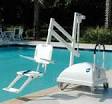In 1990, the American with Disabilities Act (ADA) was signed into law by President George H.W. Bush. The ADA is one of America’s most comprehensive pieces of civil rights legislation in that it guarantees that people with disabilities have the same opportunities as everyone else to participate in the mainstream of American life — to enjoy employment opportunities, to purchase goods and services, and to participate in state and local government programs and services.
Title III of the ADA prohibits discrimination on the basis of disability by places of public accommodation, including many private businesses. It requires newly constructed and altered business facilities to be fully accessible to people with disabilities, applying the ADA Standards for Accessible Design. Facilities that don’t meet the standard may face civil penalties of up to $55,000.
For many years, people with disabilities were excluded from participating in many recreational activities, including swimming. The 2010 ADA Standards required that newly constructed or altered swimming pools, wading pools, and spas have an accessible way for people with disabilities to enter and exit the pool. The Standards also provided technical specifications for when a means of entry is accessible, such as, for pool lifts, the location, size of the seat, lifting capacity, and clear floor space.
In 2012, the U.S. Department of Justice issued guidance titled “ADA 2010 Revised Requirements: Accessible Pools—Accessible Means of Entry and Exit” to assist entities covered by Title III of the ADA, such as hotels and motels, health clubs, recreation centers, public country clubs, and other businesses that have swimming pools, wading pools, and spas, in understanding how the new requirements apply to them.
Large pools (pools with 300 linear feet of pool wall or more) must have two accessible means of entry and exit. One means of entry/exit must be a fixed pool lift or sloped entry; the other entry can be a transfer wall, transfer system, or pool stairs. Small pools (pools with less than 300 linear feet of pool wall) must provide at least one accessible means of entry/exit, which must be either a fixed pool lift or a sloped entry.
A lift, which is essentially an immersible chair affixed to a small crane that’s attached to the pool deck, allows people who are unable to use steps to easily enter and exit a pool. A fixed pool lift is one that is affixed to the pool deck or apron in some fashion. Conversely, a non-fixed lift is not affixed in any way. Many businesses with pools have purchased or own portable (i.e. non-fixed) pool lifts. If that portable lift is affixed to the pool deck, then it could be considered a fixed lift and compliant under the rules. Thus, owners of a portable lift may be able to comply with the ADA requirements by affixing lifts to the pool deck or apron.
Pool lifts are designed by different manufacturers and do vary. One may have a concave seat while another is flat. Some move slightly faster than others, and some can sway a bit during the transfer process. Some lifts may have armrests, a headrest or a seat belt; all are optional accessories. However, ADA guidelines require all pool lifts to have a footrest, a seat measuring at least 16 inches wide, and the ability to support a minimum weight of 300 pounds.
Swimming can be very therapeutic for most folks, with or without disabilities, and private homes with pools can also be fitted with portable or fixed pool lifts which are designed to be independently operated. While private homes do not need to meet the ADA guidelines, it’s still important to recognize which type of lift will work best with different types of pools. For an in-ground pool, a portable or fixed pool lift which can extend downward into the water is likely the best option. For above-ground pools, a pool lift that can extend over and into the pool will allow proper access. Of course, the main priorities, in all cases, are safety and comfort.
If you are interested in finding out more about pool lifts, call or visit us at Pacific Mobility Center. Our trained experts can help you decide the most appropriate pool lift for your pool as well as for your family member with a disability.
President, Husband, Father, Grandfather Graduate of UC Davis- Bio Sci Major- Go Aggies! Jeff has extensive experience in all of Pacific Mobility’s products and services, and specializes in accessibility products as well as stairlifts, ceiling lifts and custom wheel chairs. His hobbies include spending time with family, gardening, mountain biking, exercising and off road motorcycle riding.
24 years as Owner/President of Pacific Mobility Center – selling, installing, and servicing stairlifts, porch lifts, ceiling lifts, pool lifts, handicap ramping, specialty wheelchairs, scooters, power wheel chairs, and other power mobility devices
Certified Environmental Access Consultant since 2008
Licensed General Contractor since 1998
Certified Aging in Place Specialist since 2016
Board Member for Home Access Professionals
Member of Association of Members of the Accessibility Equipment Industry (AEMA)




